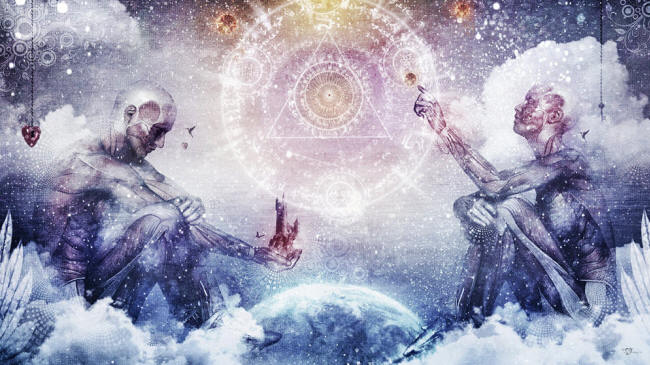|
There is a lot written about shadow and what it is.
The direction is clear.
Shadow is something we repress and hide from others, and in
most cases, from ourselves. Where does it originate and what can we
do to integrate or heal it?
I'd say a little bit of both.
On the human collective level, we carry trauma related to suffering and aggression of our ancestors.
But for the most part,
our shadow develops during this
lifetime in the form of a complex and sophisticated personality,
that keeps us with a sense of control.
Deep down we feel
vulnerable but try to hide it
We continuously face and fear exposure of our contradictory complexity, towards ourselves and others. Instead of delving into the depth of our psyche and inviting more consciousness, we would rather guard ourselves.
The more conscious we are, the more responsible we become for our actions.
One of the reasons we so
meticulously hide our shadow is because we don't want to carry the
consequence of our actions. And so, our vulnerability and shadow are
closely linked.
Abiding by a strict morality, adhering to ideologies, be they social, political or spiritual, or relying on religious dogma, all achieve exactly that protection. The kind of protection in which we cradle ourselves in feelings of righteousness and innocence.
This is not to imply we shouldn't seek for our actions to be moral or avoid believing but to become aware when they are used in service of feeling superior over others.
Interestingly enough, our
wish to remain innocent is a big shadow in and of itself.
Let's say we want to be recognized for something we've done. Instead of asking for acknowledgment, we hide it through false humility and become resentful for not getting the attention we feel we deserve.
Another example is our need to belong and be important to others. But again, instead of communicating this need, which makes us vulnerable to rejection, we make others feel important in the hope of being praised for our actions.
Over time we've developed innumerable sophisticated ways to sugarcoat our shadows and feel in control.
This happens when we try to control our environments by behaving as victims, gaining respect through false humility, moral superiority and other forms of manipulation.
When we talk about shadow
integration, it's crucial we are precise as to what the facets of
our shadow are.
Any judgment of what we discover in ourselves is a hidden attempt at victimizing ourselves and finding excuses.
The 'why' is of secondary
importance here, because the list of reasons is endless and the
absolute source is difficult to pinpoint, but the urge to limit our
vulnerability is still there.
We want to return integrity that comes with the responsibility of belonging to a history and culture that experiences a great deal of suffering and is greater than our individual selves.
Integrating our shadow implies allowing the darkness to be part of us, without the desire to surpass it.
...living inside us.
We want to clarify first and foremost to ourselves how we play power games and seek control. This acknowledgment doesn't necessarily reduce the hurt to ourselves or others or enable us to change.
There is no certain outcome from shadow integration and that's a tough pill to swallow.
What we're 'simply'
doing, is bringing something hidden to light, without the attempt to
make it more or less significant or dramatic, but rather see it as
it is, thereby becoming more aware.
We will feel the pain of lies, betrayal and hurt to others during this observation. And in the process of doing so, holding back judgment, positive or negative, is truly challenging.
How is it possible 'not to comment' on what we regard as a personal experience?
We need to understand that any commentary also contains the attempt to change the experience, be it freeing or punishing to us.
What has been done is in
the past and can't be undone; it can only be held and by holding it
patiently, more facets can emerge and be seen. Like when a child
injures itself, we can only hold them to share the pain of waiting
for healing to take place, but the magic of healing has its own
mysterious timeline.
It shows us our
limitations and that is something we don't want to feel. Maximizing
our potential for our own feelings of greatness is just another
shadow. Acknowledging the limitation of our potential, without
minimizing our strength or exercising false humility, allows us to
share our light.
Through this experience,
we can get in touch with a humility and simplicity, that can often
touch something at our core, which is mystically meaningful and
expanding.
Shadow integration is a lifelong and even a magical process.
It happens when we are completely truthful, giving up all deals with God or fate, and surrendering to what we essentially are:
We want to invite feeling
the pain our shadow reveals to us, without seeking redemption. In a
way, every time we say yes to a shadow part in us, we agree to
re-enter continuous vulnerability of being human.
|


